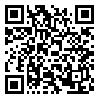Articles In Press
Back to the articles list |
Back to browse issues page
Ethics code: Ethical Considerations This study adhered to ethical research guidelines and best practices for scop
1- Student Research Committee, Faculty of Nursing, AJA University of Medical Sciences, Tehran, Iran.
2- Department of Community Health and Research,Faculty of Nursing, AJA University of Medical Sciences, Tehran, Iran. ,maryamshabanyi@yahoo.com
2- Department of Community Health and Research,Faculty of Nursing, AJA University of Medical Sciences, Tehran, Iran. ,
Abstract: (633 Views)
Background: Bioterrorism, with a high fatality rate, poses a serious threat to public health. This scoping review examined the types of bioterrorism training for healthcare personnel in Iran, assessed their level of awareness and preparedness, and identified educational gaps to inform strategies for strengthening national preparedness.
Materials and Methods: A scoping review was conducted through a search of national and international databases in both Persian and English, including SID, Magiran, IranDoc, PubMed, ScienceDirect, and Web of Science, as well as Google Scholar, covering 2014–2025. The five-stage framework developed by Arksey & O’Malley (2005) guided the process.
Results: Twenty-one relevant articles were identified and categorized into three groups: (a) Experimental and Quasi-experimental Studies (n=10), (b) Descriptive and Cross-sectional Studies (n=7), and (c) Review Studies (n=4). Experimental studies highlighted three training approaches: Experiential Learning, Traditional Learning, and E-learning. Descriptive studies showed low awareness and preparedness among healthcare personnel, while review studies emphasized the role of training in enhancing readiness.
Discussion: Findings indicated that experiential learning, including simulations and workshops, improved knowledge, attitudes, and performance among healthcare personnel, whereas traditional lectures had a limited impact. E-learning showed positive outcomes, but standardized curricula and sustainable programs were lacking in Iran. Therefore, practical, context-specific, and interdisciplinary training was essential to close knowledge gaps and enhance preparedness for bioterrorism incidents.
Conclusion: Simulated training, practical exercises, and scenario-based workshops effectively improved preparedness. Policymakers should integrate training, enhance collaboration, and develop monitoring systems. Overall, strengthening bioterrorism training and preparedness supports healthcare resilience and contributes to national security.
Materials and Methods: A scoping review was conducted through a search of national and international databases in both Persian and English, including SID, Magiran, IranDoc, PubMed, ScienceDirect, and Web of Science, as well as Google Scholar, covering 2014–2025. The five-stage framework developed by Arksey & O’Malley (2005) guided the process.
Results: Twenty-one relevant articles were identified and categorized into three groups: (a) Experimental and Quasi-experimental Studies (n=10), (b) Descriptive and Cross-sectional Studies (n=7), and (c) Review Studies (n=4). Experimental studies highlighted three training approaches: Experiential Learning, Traditional Learning, and E-learning. Descriptive studies showed low awareness and preparedness among healthcare personnel, while review studies emphasized the role of training in enhancing readiness.
Discussion: Findings indicated that experiential learning, including simulations and workshops, improved knowledge, attitudes, and performance among healthcare personnel, whereas traditional lectures had a limited impact. E-learning showed positive outcomes, but standardized curricula and sustainable programs were lacking in Iran. Therefore, practical, context-specific, and interdisciplinary training was essential to close knowledge gaps and enhance preparedness for bioterrorism incidents.
Conclusion: Simulated training, practical exercises, and scenario-based workshops effectively improved preparedness. Policymakers should integrate training, enhance collaboration, and develop monitoring systems. Overall, strengthening bioterrorism training and preparedness supports healthcare resilience and contributes to national security.
Send email to the article author
| Rights and permissions | |
 |
This work is licensed under a Creative Commons Attribution-NonCommercial 4.0 International License. |







